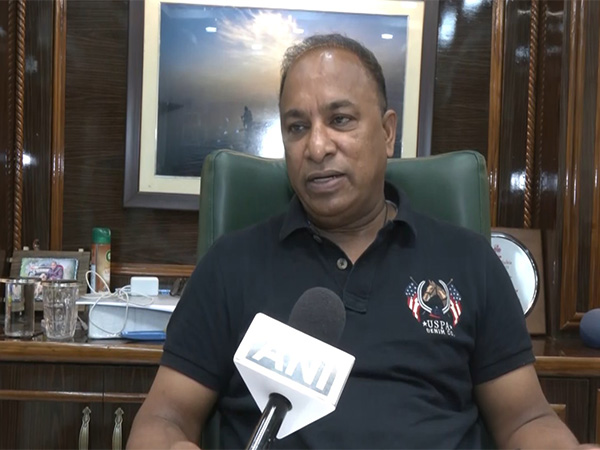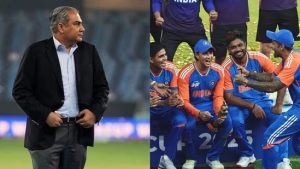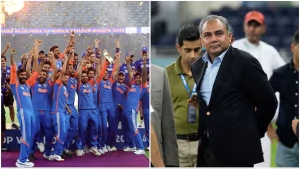New Delhi – The BCCI Asia Cup trophy protest has intensified following Asian Cricket Council chief Mohsin Naqvi’s controversial decision to take the championship silverware and medals to his hotel room after India refused to accept them during the presentation ceremony. BCCI secretary Devajit Saikia has strongly condemned this action, describing it as “totally unexpected” and “unsportsmanlike” behavior.
The BCCI Asia Cup trophy protest stems from India’s principled stand against receiving the trophy from Naqvi, who serves simultaneously as ACC president, Pakistan Cricket Board chairman, and a Pakistani government minister known for his vocal anti-India positions. This multifaceted role created an untenable situation for the Indian team following their victory over Pakistan.
Political Tensions Underpinning Trophy Refusal


Saikia articulated the core reasoning behind the BCCI Asia Cup trophy protest by emphasizing India’s ongoing tensions with Pakistan. “India is fighting a war with a country, and a leader belonging to that country was supposed to hand over the trophy to us,” Saikia explained, establishing the political context for India’s refusal.
The BCCI Asia Cup trophy protest reflects deeper geopolitical realities that have increasingly influenced cricket diplomacy between the two nations. Saikia emphasized that accepting a trophy from someone representing a country “waging war against our country” was impossible, making the team’s boycott a matter of national principle.
Criticism of Naqvi’s Trophy Seizure

The BCCI Asia Cup trophy protest escalated significantly when Naqvi reportedly took the trophy and medals meant for India to his own hotel room rather than making alternative arrangements for their delivery. Saikia expressed shock at this development, stating that India’s refusal to accept the trophy from Naqvi “does not mean that the gentleman will take the trophy and the medals, which are to be given to our country, to his own hotel room.”
This unexpected turn in the BCCI Asia Cup trophy protest transformed what was initially a ceremonial boycott into a dispute over rightful possession of championship prizes. Saikia expressed hope that “his good sense will prevail” and the items would be returned promptly.
Formal Complaint and Strong Language

The BCCI Asia Cup trophy protest will result in official action, with Saikia announcing plans to “lodge a very strong protest against the behaviour of the gentleman in today’s prize distribution ceremony.” This formal complaint represents the BCCI’s determination to address what it views as improper conduct by the ACC leadership.
Saikia reiterated the severity of the BCCI Asia Cup trophy protest, stating that the BCCI would “launch a very serious protest against ACC chief Mohsin Naqvi.” The strong language indicates the board’s view that Naqvi’s actions crossed acceptable boundaries of sporting conduct.
Unsportsmanlike Conduct Allegations
Central to the BCCI Asia Cup trophy protest is the allegation that Naqvi’s behavior violated fundamental sporting ethics. Saikia characterized the trophy seizure as “very unfortunate and unsportsmanlike,” emphasizing that proper protocol would involve making alternative arrangements for trophy delivery rather than retaining it personally.
The BCCI Asia Cup trophy protest argues that while India had legitimate reasons for refusing to accept the trophy during the ceremony, the ACC chief’s response demonstrated poor judgment and disrespect for the champions’ rightful claim to their prizes.
Demand for Immediate Trophy Return
The BCCI Asia Cup trophy protest includes a clear demand for prompt resolution. Saikia expressed hope “that the trophy and the medals will be returned to India as soon as possible,” establishing an expectation for swift action to resolve the impasse.
This demand within the BCCI Asia Cup trophy protest reflects the board’s position that regardless of ceremonial disputes, India’s ownership of the championship silverware is unquestionable and should be acknowledged through proper delivery mechanisms.
Context of Ongoing India-Pakistan Cricket Tensions
The BCCI Asia Cup trophy protest occurred against a backdrop of escalating India-Pakistan cricket tensions throughout the tournament. The Indian team maintained their stand by refusing customary handshakes with Pakistani players, demonstrating consistent adherence to their policy of minimal interaction with rivals during the competition.
These cumulative tensions created the environment for the BCCI Asia Cup trophy protest, with the trophy ceremony representing the culmination of simmering diplomatic and sporting conflicts that characterized the entire tournament.
Match Victory and Championship Performance
Despite the controversy surrounding the BCCI Asia Cup trophy protest, India achieved a hard-fought victory over Pakistan in Dubai, successfully chasing down a 147-run target. Tilak Varma emerged as the match hero with an unbeaten 69 off 53 balls, stabilizing India’s chase during difficult circumstances.
The sporting achievement that should have been celebrated through normal trophy presentation instead became the catalyst for the BCCI Asia Cup trophy protest, highlighting how geopolitical tensions increasingly overshadow athletic accomplishments in India-Pakistan cricket encounters.
Broader Implications for Cricket Governance
The BCCI Asia Cup trophy protest raises fundamental questions about the Asian Cricket Council’s governance structure and the appropriateness of having officials with dual roles that create conflicts of interest. The controversy suggests that future tournaments may require clearer protocols for ceremonial functions when political sensitivities are involved.
The BCCI Asia Cup trophy protest may ultimately influence how cricket’s governing bodies structure leadership positions and manage ceremonial responsibilities in tournaments involving nations with strained political relationships, potentially leading to reforms in governance practices.

